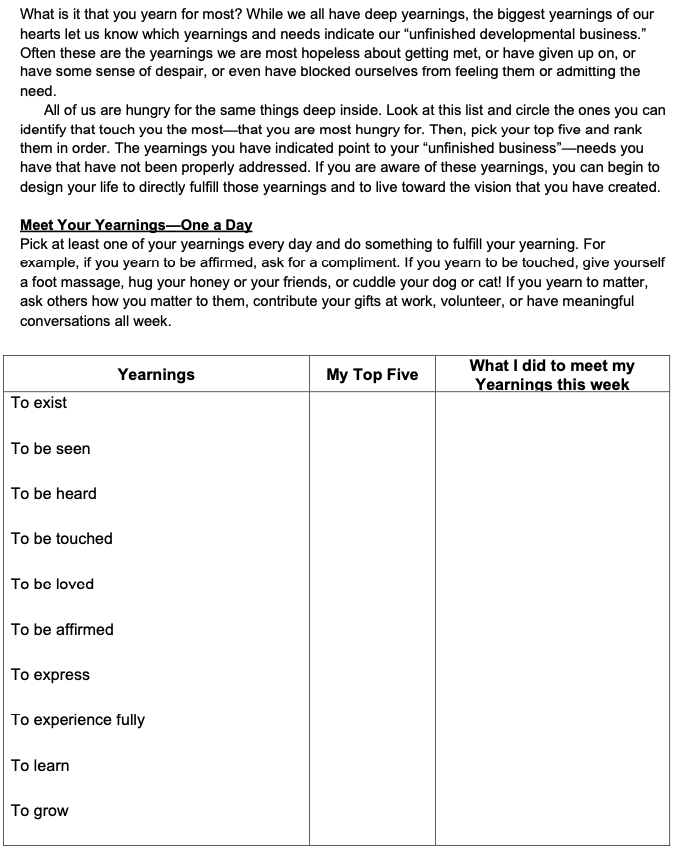UNFINISHED BUSINESS
This ideal rarely occurs, so each of us has aspects of our needs and yearnings that weren’t met, not met consistently, or met with anger, ambivalence, or upset. As infants, these experiences begin wiring the belief that some of our needs and yearnings are impossible to meet or are bad, too much, or not OK. These unmet yearnings become our unfinished developmental business.
Our childhood experiences reinforce the matrix of our mistaken beliefs. For example, if we weren’t affirmed as a child by our father, we may look at all of the male authority figures in our life for affirmation when that is not their primary job. Or if we felt like our mother never really saw us for who we are, we may have an issue with people who remind us of our mother—feeling as if they never really understand us.
How Do Unmet Yearnings, Unexpressed Feelings and Unfinished Developmental Business Show Up In Our Relationships?
Now it is time to explore these unmet yearnings, noticing how they show up in our unfinished developmental business. We also look more closely at the feelings related to our unmet yearnings and unexpressed thoughts and feelings. Identify your areas of unfinished developmental business—your unmet yearnings and the related unexpressed feelings (anger, fear, sadness, hurt, rage, and possibly hate or even joy, bliss, and gratitude) as well as your unexpressed thoughts and truths.
If you don’t believe you have any of these yearnings, feelings, or thoughts, go back to your rules, myths, and beliefs to see which feelings were OK to express and which ones weren’t. Examine the messages you received about what thoughts, feelings, and ways of being are appropriate and which aren’t. Be aware of the beliefs that might be blocking you. Watch for the “myth conceptions” and stinking thinking that are blocking your discovery. Look more closely at your needs and yearnings, emotional expression, and lack thereof, and your withheld thoughts and judgments.
Your unexpressed thoughts and feelings hold great information for you. Be aware of where, with whom, and in what situations you express and in which you withhold. In what situations or with what topics do you feel like a child with your parents again? Identifying these thoughts, feelings, and situations is a step to prepare you for expressing them to your parents and to others. With this preparation, you may feel more like an adult when you are interacting with your parents and also have more in-the-moment truth with others. This awareness can create an opening for more connection, love, and compassion for yourself, your parents, and others—building the foundation for fun and nourishing relationships.
Through this exercise you begin to understand your unfinished developmental business and gain a better understanding of yourself and your developmental course for lifelong development—while taking responsibility for your satisfaction. In more advanced group coaching programs, you have structured and sequenced life assignments to help you fill in these developmental gaps, grow yourself up, and build a powerful foundation for the relationships you want. But for now, become aware of your unfinished business, chart the course for your life journey, and experiment with meeting your unmet yearnings and expressing the feelings you’ve been withholding.
You Now Are Going to Inventory
—Your Unfinished Business
—Your Unmet Yearnings
—and Your Unexpressed Feelings
—and You Are Going Meet and Express Them!
You have been tracking your conscious and unconscious self like a hunter or perhaps a detective, discovering and uncovering your family rules, myths, and beliefs and your stinking thinking, as well as developing a vision for your relationship with yourself and others. You have been exploring how your early attachment experiences laid the foundation of your matrix and your unconscious beliefs about yourself and the world.
You can see more clearly how your family training, conditioning, and programming contributed to who you have become, how you relate, and how you live your life. It’s as if you have been finding the puzzle pieces of your life and how you have created it. You have now started to create a new puzzle, deciding which pieces fit, where you want them to go, and which new pieces you want to add. You have begun your journey to consciously become the author of your own life—creating your personal vision for your life, claiming the life you have dreamed of, and determining the life you want to live.
You are laying the groundwork for becoming more individuated and differentiated, defining your own life, becoming aware of your unfinished business to ‘grow yourself up’—one of the conditions of developing rich relationships.
Now intend to begin noticing your unfinished developmental business. I want you look at your unmet yearnings, as well as your unexpressed thoughts and feelings.
Each of us has deep yearnings—a yearning to be seen, to be affirmed, to matter, to be heard, to make a difference, and many more.
As you have these insights regarding unexpressed thoughts and feelings, practice taking 100% responsibility for your happiness and satisfaction. Satisfaction and happiness require that you take responsibility to express your thoughts and feelings and engage to meet your yearnings. Becoming aware of what you yearn for and meeting your yearnings is key to becoming satisfied. You also build the empowering belief that you deserve to have your yearnings met and that you matter.
Expressing yourself and letting others know what you think and feel is part of being satisfied and building nourishing relationships. What do you yearn for? What is it that you truly want? How do you want your relationships to be? What outcomes do you desire? What are you feeling? Thinking? What do you yearn to express? What do you desire to be known? Take responsibility to be satisfied and get your yearnings met.
Our early attachment experiences form the matrix of our beliefs about our yearnings and having them met. Ideally, as infants, our parents and caregivers accurately saw us in the here and now, with positive regard, consistently, and unconditionally. This ideal rarely occurs, so
Catch & Engage with Unfinished Business, Feelings, & Yearnings
Main Assignment
Create an inventory of your unfinished developmental business—to become more aware of what is going on within you and to consciously take steps to meet your yearnings and express your feelings more freely. In doing your inventory, don’t ask yourself, “Do I have unfinished business?” but rather, “What unfinished business do I have that is showing up today, with this person, in this situation?” During the day, it is not “Did I have unexpressed thoughts or feelings?” or, “Do I have unmet yearnings?” but rather, “What unexpressed thoughts, feelings, and unmet yearnings do I have?”
Most of us are in the habit of ignoring unfinished business, thinking “this is the way it is” rather than “this is a function of my unfinished personal development.” You may be surprised at how many times you feel hurt with a minor residual resentment or unexpressed thought or feeling that you never would have paid attention to without this week’s exercise. The purpose of this week is not to correct all of your unfinished business (that is a lifelong project); however, you may discover that you do in fact address unfinished business simply in acknowledging it. As you become aware of unmet yearnings, experiment with different ways to meet them and as you realize you have unexpressed feelings, go for expressing them!
Each day, identify all the unfinished developmental business that you can. If you want, make copies of the attached worksheets to use each day to conduct your inventory. Or draw them in your journal. Be as thorough and complete as possible. Experiment with meeting unmet yearnings and expressing unexpressed feelings.
Remember, you may not notice your unfinished business right away. In the weeks to come, you will learn to see your unfinished business as it shows up in resentments, projections, and transferences in your relationships. But for this week, you will be learning to look for other aspects of unfinished business.
There are many faces of unfinished business—through unexpressed feelings, emotions, unmet yearnings, mistaken beliefs, etc. It may show up as aggression or expressed victimhood. Or it can show up in a happy face, joke, or sarcastic remark. It could be gossip or avoidance or shutting down. It shows up in emotional charges, however you experience them. Perhaps for you, it comes out as being formal, tight and distant, or covertly hostile by being withdrawn. Or do you suppress and mask those feelings with soft addictions or drinking or …? What face do you put on?
Very-Able Assignments
Here are some ideas of How to Implement These Exercises
Acknowledge your yearnings and take action to meet them. Continually go back to your list all week and see what more there is to add—and express! Use the Unfinished Developmental Business Inventory Worksheet on Family Work to summarize your “family work”—your main unfinished business as it relates to family members and yourself. Capture your discoveries in your journal. Go ahead and document these revelations in the moment, perhaps in your notes, or into your calendar. Or with ChatGPT!
How To Practice Being 100% Responsible for Your Own Happiness and Satisfaction
While you are becoming aware of your unfinished developmental business, practice taking 100% responsibility for your own happiness and satisfaction. Notice where holding back your yearnings and feelings in relationships has left you dissatisfied. As you begin to shed the light on your unfinished business, you have the opportunity to reclaim your own choices and creation. You can take responsibility in any moment for being satisfied and meeting your yearnings.
Take risks in expressing those
unexpressed feelings.
Go back to that person and say what you didn’t say the day before, give yourself permission to be more expressive and express the previously inexpressible.
What If You Invite Others to Join You on your Journey?
Maybe invite others to share your journey of learning and growing as you develop more tools of engagement and intimacy. Encourage them to take a deeper look into their yearnings, and embark on a process of discovering unfinished business, thus helping take responsibility for their own happiness and satisfaction. Share these videos and exercises with them!
Remember that everyone you meet has unfinished developmental business. When we “prick” each other, we may be stirring up our own unfinished business—and possibly others’ too! It can be tempting to retreat into the comfort zone of what’s “OK” in your conditioning when this happens. You might unconsciously decide to play nice and not rock the boat, for instance—but at what cost to your full happiness and satisfaction in relationship? Using this Rule of Engagement, start looking and listening for what would have you be happy and satisfied—and remember that you are 100% responsible for creating that outcome, no matter how triggered you (or others) are.
Use these exercises to reveal and Liberate yourself in honor of your Yearnings. As you learn about your own unfinished business and take responsibility for your own happiness and satisfaction, delight in your expanding capacity for how robust your relationships can be!
You Can Inventory Your Unmet Yearnings
What is it that you yearn for most? While we all have deep yearnings, the biggest yearnings of our hearts let us know which yearnings and needs indicate our unfinished developmental business. Often, these are the yearnings we are most hopeless about getting met, or have given up on, or have some sense of despair about, or have even have blocked ourselves from feeling them or admitting the need for them.
All of us are hungry for the same things deep inside. Refer to the list of Universal Yearnings and circle the ones that touch you the most—that you are most hungry for. Then, pick your top five and rank them in order.
The yearnings you have indicated point to your unfinished business—needs you have that have not been properly addressed. If you are aware of these yearnings, you can begin to design your life to fulfill those yearnings directly and live toward the vision that you have created. Experiment this week with taking action to meet those yearnings—especially the ones you’ve given up on, resigned yourself to not getting met, felt the most hopeless about fulfilling, or have been the saddest or most hurt about.
You Can Meet Your Yearnings—One a Day Or More!
Pick at least one of your yearnings every day and do something to fulfill your yearning. For example, if you yearn to be affirmed, ask for a compliment. If you yearn to be touched, schedule a massage, hug your honey or your friends, or cuddle your dog or cat! If you yearn to matter, ask others how you matter to them, contribute your gifts at work, volunteer, and have meaningful conversations all week.
Try Scanning for Unexpressed Feelings
At the end of each day, scan for what you did not express. What do you hold back? With whom and in what situations? These feelings are “unfinished” and will continue to accumulate. Be aware of what you do not express and do not complete. Use the attached worksheet to help you. In the left column, write the day of the week. In the middle column, circle any unexpressed thoughts or feelings, then fill in the situation or with whom in the right column.
Experiment with expressing parts of yourself that are in the ‘Not OK’ zones of your conditioning. Take risks in expressing the more hidden aspects of yourself, stretch into expressing emotions you usually hold back.
Pick at least one of your Yearnings every day and do something to fulfill your yearning.
Unmet Yearnings Inventory
Scan for Unexpressed Thoughts and Feelings
The Love Sponge – My False Self EXAMPLE
The Love Sponge
Fill in this False Self/Love Sponge Diagram to be aware the your “Not OK” parts are part of your developmental business to complete—to be acknowledging and accepting of all parts of yourself is the goal. Use this to help you map your family work and self-work to be completed.
Unfinished Developmental Business Inventory
My unfinished business with my family is…








